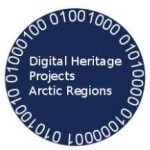Prior to any data collection, 47 search terms were defined to assist with the identification
of projects for both the literature review and the online survey. The most common terms
used were “digital”, “heritage”, “culture”, and “Arctic”. In addition to the search terms, it
was predefined what information would be extracted from each of the projects identified
through the literature review and online surveys, such as, study location, digital heritage
category, type of data collected, dissemination process, copyright/intellectual property,
etc. Find a full list of search terms and the data extraction forms in the appendix of the
final report submitted to SSHRCC.
Literature Review – Data Collection
The predefined search terms were initially used to locate and identify digital heritage
projects and their literature in online databases, such as Google Scholar. However, our
search terms yielded very few projects but did identify other potential resources. The
initial projects and other sources were then further searched for more projects and
literature. Peer-reviewed journals, books, popular publications and grey literature were identified where possible for each project and from all these forms of literature data was compiled about each of the projects through the data extraction forms.
Results
The literature review identified 52 projects, of which 41 were associated with peer reviewed journal articles, 23 with books, and 16 with popular publications such as magazines and newspaper articles. All the literature associated with the projects can be
found on the AINA database.
Online Survey – Data Collection
Projects for the online survey were identified through three separate approaches. The first
was projects known through previous research. The second was through web searches
using the predefined terms set out above. The third was approaching organisations such as
the International Arctic Social Sciences Association (IASSA); Yukon Historical and Museums Association; and the Canadian Museum Association to promote the survey. The
online surveys were created through Google Forms, based on the data extraction forms
mentioned above, and sent to community heritage organisations and individuals.
Results
A total of 152 online surveys were emailed to a variety of local, government, and academic
organisations, of these, 26 responses were received.
Case Study – Data Collection
The community of Arviat (ᐊᕐᕕᐊᑦ) was selected as several communities- run
organisations that focus on local and regional heritage were known to the researchers
prior to the study starting as well as individuals within the community who have dedicated
large portions of their lives to collecting oral histories, traditional place names, songs and
stories. A series of interviews were conducted with a number of groups and individuals
over a period of a one week visit.
Results
Due to time constraints, the Arviat Heritage Society and Arviat Film Society were the only
organisations approached for interviews.

